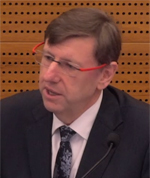ClearView Life has admitted to more than 300,000 breaches of anti-hawking provisions related to the sale of direct life insurance by the company.

The admission was made by ClearView Chief Actuary and Risk Officer, Greg Martin who appeared at the first day of hearings which are examining practices within the life insurance sector.
The breaches, which took place between January 2017 and March 2017, may run as high as 303,000 and were confirmed by Martin under questioning by Counsel Assisting the Commission, Rowena Orr, QC.
“ClearView had estimated that it had breached the anti-hawking provisions, which as we’ve discussed was a criminal offence, somewhere between 300,000 and 303,000 times over a period of just over three years, between January 2014 and March 2017?” Orr asked Martin.
“Yes, that’s correct,” Martin replied, confirming the figures a moment later in a second exchange with Orr.
“ClearView had estimated that it had breached the anti-hawking provisions…somewhere between 300,000 and 303,000 times…”
Orr told the Commission that ClearView had made unsolicited phone calls to members of health fund Bupa which previously owned the insurer, as well as members of the public whose details were purchased from three marketing and lead generation firms.
Under Section 992A of the Corporations Act, anti-hawking provisions prohibit the selling of life insurance products through unsolicited phone calls unless the insurer provides a customer with a PDS and an opportunity for the person contacted to be placed on a ‘Do Not Call’ register held by the insurer. Breaches of the section of the act are a criminal offence.
When questioned as to why ClearView breached the provisions on so many occasions during the three-year period Martin said the insurer was unaware it was doing so.
“At the time that we were doing that, we didn’t understand that we were breaching the anti-hawking rules. It’s a – it’s nothing – that’s – that’s nothing more complex than that. We just got that wrong. We made a mistake,” Martin said.
Clearview Life filed two breach notifications with ASIC, the first in late 2016 informing the regulator the insurer “…had identified likely noncompliance with section 992A of the Corporations Act…” in relation to phone calls made during 2015 and 2016. The second notification was made in early 2017 informing ASIC of similar concerns about calls made to people whose details were purchased from third parties.
Orr told the Commission there were three causes for the systemic compliance issues: remuneration structures, a culture that that tolerated aggressive sales tactics ahead of compliance, and large-scale deficiencies in ClearView’s compliance program.
Martin agreed with all three claims by Orr, saying remuneration was a driver of behaviour, that ClearView’s direct life insurance business had the culture described by Orr and the compliance program was inadequate.
ClearView has since closed its direct life insurance business but earlier this year was required by ASIC to refund $1.5 million to 16,000 customers after the regulator found it had used unfair and high pressure sales practices when selling products directly to consumers (see: ClearView to Pay $1.5M for Poor Direct Life Sales Tactics).
Martin said ClearView had no intention to return to direct life insurance sales via outbound calls and that it was difficult to offer a direct product over the phone that was compliant and financially viable.
“In retrospect, I find it difficult to understand how you can reconcile those things. My difficulty, personally, with it is I just don’t understand how a customer in a phone call that lasts 20 minutes can come to a view of understanding exactly what they’ve bought in a fairly complex sort of area of financial services,” Martin said
The Commission also heard evidence from the Craig Orton, Chief Operating Officer of direct life insurer, Freedom Insurance, which sold life and trauma insurance, as well as accidental death, accidental injury, loan protection and funeral insurance through sales calls.
Orton told the Commission Freedom had decided on the afternoon of 10 September that it would cease selling all products except funeral insurance and loan protection cover through outbound sales calls.



